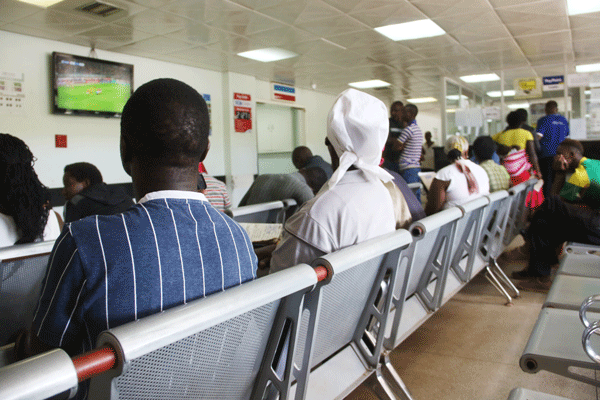
It’s a couple of minutes before 2pm and Leonard Muzondiwa sits under a tree just outside the Mbuya Nehanda maternity wing at Harare’s Parirenyatwa Hospital, with his head hanging miserably between his legs.
By Phyllis Mbanje
His wife, Tendai, is distraught because her younger sister has just lost a baby.
Muzondiwa is concerned about his wife, who has not taken the news very well. She single-handedly raised her sister, Maureen, assuming the mother’s role after their parents died.
He is also upset about the passing on of the baby and like his wife, puts the blame on the scarcity of qualified personnel at the maternity wing after doctors and nurses downed tools recently, demanding better living conditions.
“It is very disheartening because we understand students are the ones attending to our relatives,” he says in a raspy voice.
Tendai is in no mood to proffer lengthy responses and simply says, “We believe she [Maureen] did not receive enough attention.”
She angrily snatches her worn out handbag while mumbling something that no one could comprehend.
- Chamisa under fire over US$120K donation
- Mavhunga puts DeMbare into Chibuku quarterfinals
- Pension funds bet on Cabora Bassa oilfields
- Councils defy govt fire tender directive
Keep Reading
Muzondiwa shakes his head with a look of resignation and follow his wife.
Their anger was shared by several other patients and relatives around the hospital.
“What is so frustrating is that we really have no choice but to come here, it’s a huge gamble,” said an elderly man in his 50s, who had just dropped off a young woman, who was in labour.
“I was told that the midwives have also joined the doctors’ strike, but what can I do when she is in labour?”
The hospital’s outpatient department was a hive of activity on Friday as more pregnant women were being admitted, some having been referred from clinics around the capital.
There are reports that patients are dying due to the industrial action, as there is no one to attend to them.
Itai (40), who is nursing 10 broken ribs after being involved in a near fatal accident along Simon Mazorodze Road, was one of those badly affected by the strike.
“Itai was badly hurt and this was proved by X-ray results, which indicated he had 10 broken ribs and fractured both hands,” said a close relative.
But Itai was only put on pain killers for an entire night, until the next morning when a doctor came to see him.
The relatives alleged the doctor took the nurses to task for not treating the matter with the emergency it deserved.
Itai was only admitted to the wards late in the day after spending the night and part of the day on an uncomfortable steel bed in the casualty section at Parirenyatwa Hospital.
“The family was largely responsible for him, trying to comfort him and even when he was finally admitted to the wards, it was the relatives who took him there,” said the relative.
Itai is one of the lucky ones to survive the traumatic incident that could have easily cost him his life and robbed his wife and four children of a breadwinner.
There are also reports that speedy treatment is only being rendered to those who have connections at the public health institutions.
In a country facing an economic meltdown, the strike by healthcare personnel has impacted more on those of lesser means who rely on public health facilities.
With less than 10% of the population on medical insurance, the bulk of Zimbabweans have been forced to patronise the substandard hospitals that offer questionable services, which include obsolete equipment, a demoralised workforce and an unacceptable doctor-patient ratio of one per 250 000 inhabitants.
For the past two weeks, public hospitals have been operating on skeleton staff but patients are still coming in their numbers because they have no option.
The private medical services sector in Zimbabwe is among the most expensive in the region.
Those on medical aid have to contend with shortfalls and restrictive services within their scheme plan.
“It is depressing to note that most hospitals have closed their outpatients departments and cancelled emergencies, denying people access to health care,” Community Working Group on Health director, Itai Rusike, said.
The doctors wanted the government to review their on-call allowances, implement a motor vehicle duty-free facility and employ them upon completion of their two-year internship.











